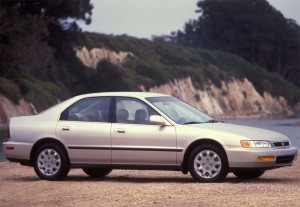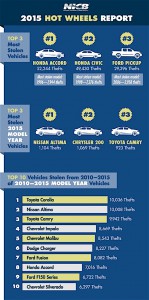For more than a decade, the Honda Accord was the best-selling car in America and its compact sibling, the Civic, wasn’t too far behind. The pair are still popular as they are once again the most stolen vehicles in the U.S.
The 1996 Honda Accord and 1998 Honda Civic topped the National Insurance Crime Bureau’s 2015 Hot Wheels list of most stolen vehicles. Not surprisingly, the top five on the list is rounded out by other very popular selling vehicles: 2006 Ford full size pickup, 2004 Chevrolet full-size pickup and the 2014 Toyota Camry.
The high volume of sales is directly tied to holding the top spots: thieves steal vehicle for parts, which are used to keep many of those vehicles on the road, according to the NICB. They also feature no or easily defeat anti-theft technologies.
The top 10 list and the total number of that model overall stolen in 2015 includes:
- 1996 Honda Accord (52,244)
- 1998 Honda Civic (49,430)
- 2006 Ford full-size pickup (29,396)
- 2004 Chevy full-size pickup (27,771)
- 2014 Toyota Camry (15,466)
- 2001 Dodge full-size pickup (11,212)
- 2014 Toyota Corolla (10,547)
- 2015 Nissan Altima (10,374)
- 2002 Dodge Caravan (9,798)
- 2008 Chevrolet Impala (9,225)
“While older vehicles still dominate our Hot Wheels most stolen list, the number of late model vehicles with anti-theft protection on the list goes to show that technology isn’t foolproof,” said NICB President and CEO Joe Wehrle. “Criminals are doing their best to defeat anti-theft technology through hacking and other means while, at the same time, manufacturers and others are working to improve security.
(Better late than never: Chevy Volt hits 100,000 mark. For more, Click Here.)
The top 10 list of 2015 model vehicles stolen in 2015 and how many of each includes:
- Nissan Altima (1,104)
- Chrysler 200 (1,069)
- Toyota Camry (923)
- Toyota Corolla (776)
- GMC Sierra (670)
- Dodge Charger (666)
- Hyundai Sonata (632)
- Chevrolet Malibu (629)
- Chevrolet Impala (594)
- Chevrolet Cruze (586)
While new vehicles often feature the latest in anti-theft technology, car thieves often have their jobs made easier for them by the owners of the vehicles, NICB noted.
(Click Here for details about Delphi’s autonomous fleet launch.)
“Far too often, drivers leave their vehicles unlocked or with the keys inside, making it way too easy for an opportunistic thief,” Wehrle said. “And as we noted recently, many stolen cars are not reported as typical thefts to police because many of today’s thefts are financial crimes involving complicated VIN switching, cloning, straw buyers, illegal exports and other sophisticated criminal methods.”
Vehicle theft is a severe economic hardship for its victims—especially if a vehicle is uninsured. That is why NICB continues to advise all drivers to review our four “Layers of Protection”:
- Common Sense: Lock your car and take your keys. It’s simple enough, but many thefts occur because owners make it easy for thieves to steal their cars.
- Warning Device: Having and using a visible or audible warning device is another item that can ensure that your car remains where you left it.
- Immobilizing Device: Generally speaking, if your vehicle can’t be started, it can’t be stolen. “Kill” switches, fuel cut-offs and smart keys are among the devices that are extremely effective.
- Tracking Device: A tracking device emits a signal to the police or to a monitoring station when the vehicle is stolen. Tracking devices are very effective in helping authorities recover stolen vehicles. Some systems employ “telematics,” which combine GPS and wireless technologies to allow remote monitoring of a vehicle. If the vehicle is moved, the system will alert the owner and the vehicle can be tracked via computer.
(High-tech safety features score big with motorists, says new Power study. Click Here for more.)
The NICB pointed out one more important fact: cars are lasting longer and longer. By various accounts, the average age of a vehicle on the road in the U.S. is more than 11 years old. Further, IHS Automotive estimates there are about 44 million of those vehicles on the road, which means the trend of 1990s and early 2000s Hondas being targeted by thieves isn’t likely to change soon.


